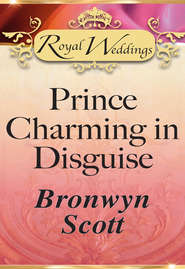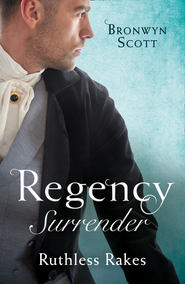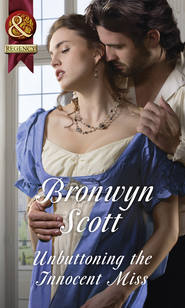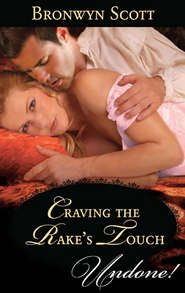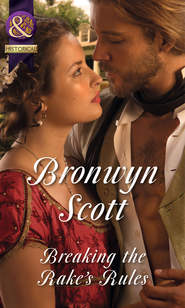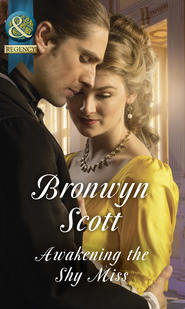По всем вопросам обращайтесь на: info@litportal.ru
(©) 2003-2024.
✖
The Secrets Of Lord Lynford
Автор
Год написания книги
2019
Настройки чтения
Размер шрифта
Высота строк
Поля
It had been a long time since she’d been surprised—not since the day Huntingdon had left for the office and never returned. Five years, eight months and three weeks, to be precise. Eliza sat back against the leather squabs of her coach and let out a deep sigh. In the intervening years, she’d become used to being the one doing the surprising; she’d had to if she meant to keep the shareholders on their toes. But Eaton Falmage, Marquess of Lynford, heir to the ducal seat of Bude, had done all the surprising this afternoon. The ambush had been her idea, hers to control, but she’d not been prepared for him. Eliza reached for her fan. From the first glance of his dark eyes, his heat had nearly incinerated her glacial cool.
Years of practice had made her confident in the belief that her skills would rise to any challenge, that her icy façade could not be cracked, that she was impervious to the powers of men. Lynford had challenged her today, though, not only as a patron, but as a woman. The former, she could deal with. Patronage was simply one of many business arrangements she conducted. The latter, however, well...that was different. She hadn’t been a woman—a real woman with real feelings and affections—since the day her husband died. For her daughter’s sake and her own sake, she couldn’t afford to indulge such a fancy.
When men looked at her, they saw a female facsimile—one that dressed elegantly, spoke with cultured tones, and danced divinely; one they often sought to possess—but the illusion fell away when she sat across from them at the boardroom table and delivered her verdicts in those cultured tones. Some men called her a snake in the grass, a viper waiting to strike, others called her a Siren, luring men to smash themselves against the icy granite of her façade. But today, Lynford had been formidable, a veritable Odysseus, undaunted by her surprise visit and undaunted by her.
She wished she could say the same. Eliza plied the fan a little faster. He was not only younger than she’d anticipated, he was also younger than her by five years. He was taller, broader, endowed with dark eyes that looked into a person’s gaze and long, powerful legs. Oh, how she loved a good pair of legs on a man and his had been on blatant display with no coats to hide them. In fact, his tight breeches and open-necked shirt had hidden nothing. He’d been in utter, unmistakable déshabillé, yet he’d not once apologised for his appearance or attempted to cover it up. The primal woman in her, so rarely unleashed, had rattled the bars of her cage, thrilling at the masculinity on show, a reminder that she wasn’t dead after all. It was an uncomfortable revelation.
Eliza closed her eyes. It had been so long since she’d felt anything akin to desire, or its milder counterpart, attraction. What a shock to discover it after five years of sexless living where she didn’t dare act either too much of a man or too much like a woman for fear she would be ridiculed for overstepping herself or taken advantage of for being herself. But what a most inopportune time for that discovery. She would have preferred Lynford to be a man nearing middle age, bearing a paunch at his stomach and silver at his temples with a conservative, tired air about him. She knew how to manage those men.
Her husband had been such a man, thirty-seven years older than she when they wed. Those men populated the Blaxland Mining Corporation board of shareholders, but Lynford exuded alertness, energy, a fresh boldness. He thought himself infallible and perhaps rightly so. He was a duke’s son. He was used to asserting himself, used to ordering the world according to his desire. He was not a businessman, a man like her husband had been, who limited the scope of his world to balance sheets. And Lynford, unlike her husband, was most definitely in his prime.
She had no such experience with a man like that: a man who looked at women and openly admired their beauty, a man who didn’t patronise, a man who matched her directness with his own. Nor could she allow herself to acquire such an experience.
The one flicker of attraction she’d felt today had been nice in its own way, a reminder that she was more than a moneymaking automaton, but she could not fan it into anything resembling a flame. She had a daughter to raise and mines to run, her husband’s legacy to preserve so that her daughter would never know want and penury as she had simply because she’d been born female. Such pursuits did not leave room for passion. Such a task required that she walk a tightrope. One false step and all she’d worked for and all she envisioned for the future could be so easily lost.
Neither did such a pursuit serve her as a patron for the school. She hoped by donating generously to his school, in return, Lynford would support her bid for establishing schools for children in the villages up and down the coast wherever there was a Blaxland mine. To mix business with fleeting pleasure could jeopardise that connection.
Hence the reason for her visit today—to see if Lynford was worth the investment. Could he get the job done, or was he another lazy dilettante? She wanted to see that everything was well in hand for the opening reception. She would do her part to make sure the conservatory succeeded. Her own plans depended on it, as did keeping her own reputation intact. The trust of her shareholders was essential now as the Porth Karrek mine prepared for expansion. She’d learned early on after taking the reins of her husband’s business that one could never have too many friends, but a woman could have too many lovers—even just a single lover was often one lover too many. A misguided affair at this juncture could cost her everything, just as it had her mother, a widow left with a daughter and a fortune and no sense about how to manage the latter.
The outcome had been obvious: her mother and her money had been soon parted thanks to an affair that had blinded her to the incompetence of her lover. Eliza had been fourteen when that had happened and she’d vowed she would never put her heart above money. Nor would she put herself in a position where money wasn’t readily available. She’d set out the next day to learn all she could about managing funds, starting with the bookkeeper for the family’s mine. Knowledge was power. She believed that education could keep the wolf from the door and it could buy her independence so that she needn’t rely singularly on a marriage to save her. There were too many women like her mother who hadn’t a clue how to manage their own freedom, who needed men. Eliza was determined to avoid her mother’s mistakes. This time, for this woman, Eliza vowed it would be different. She was far too astute to fall prey to the charms of a handsome lord.
Two days later, the Academy Open House
This time, it would be different. Eliza entered the conservatory’s drawing room with that mantra firmly entrenched in her mind. Tonight, she would be ready for the oh-so-attractive Eaton Falmage. His good looks and confident manner would not catch her by surprise. She knew what to expect now and this time they wouldn’t be alone—a point emphasised as soon as she arrived. The room was practically a crush and a very well-dressed one at that, with men in dark evening clothes and women in silks populating every corner of the grand salon. It was a far more robust turnout for the academy’s opening than she’d anticipated. This was no mere gathering of a board of directors and a few patrons. But then, perhaps the outstanding attendance stood to reason. When a duke’s heir gave a party, everyone wanted an invitation.
Eliza unfurled her fan and began to stroll about the room, looking purposeful. No one need pity her aloneness. She’d made an art of it. Over the years, she’d become accustomed to attending events on her own and others had become accustomed to it, too. She arrived alone, she left alone. She’d learned not to be afraid of her own company. She actually rather enjoyed it. There was no conversation to worry over, no egos to flatter or polite compliments to muster. She could survey her surroundings at leisure, study her options and make her own choices as to how she spent her time and who she spent it with. At the moment she wanted to spend that time with Lynford. Congratulations were in order. A private smile skimmed her lips in satisfaction as she assessed her surroundings. Lynford had succeeded against what had looked like overwhelming odds. One would never guess that two days ago the place had been in varying states of chaos.
Eliza scanned the room, her gaze glancing over the masculine decor done to perfection in shades of muted teal and beige against a backdrop of walnut panelling and chair rail that ran the perimeter, interrupted only by a bank of French doors opening to the gardens beyond where paper lanterns winked. She made a mental note of the gardens—those gardens might provide a convenient escape from the crowd should she need it.
Her gaze hurried on, still seeking as it brushed over the multi-armed brass chandelier at the ceiling, the coveted Sébastien Érard, lid raised, at the front of the room—neither item enough to halt her rampant gaze. These were not the things she was looking for. She’d nearly completed her visual circuit of the room when she found him at last, standing at the fireplace, just feet from the Sébastien Érard. It was time to test her hypothesis.
The fan in her hand halted its oscillation, her mind flooding with a certain sense of satisfaction. He was what she’d been looking for. Lynford stood in profile, talking with a group of men, all dressed alike in dark evening clothes, yet he was no more like them than the sun was like the moon. She knew instantly her mantra was wrong. This time was not going to be different after all, unless one counted the fact that Lynford was fully clothed. He was no less handsome for the more formal attire. Eliza began to ply her fan in earnest.
His dark, tangled curls were tamed tonight, carefully styled into compliance, perhaps painstakingly so given the extent of their unruliness the other day. His jaw was smooth-shaven, setting off the strong planes of his face, the wide, almost simian flare of his nose, the broad, high sweep of his cheekbones beneath his dark eyes; in his face, the elegant classical construction was unabashedly at war with the harsh masculinity of his primeval ancestors. In evening clothes, the result was devastating. He stood out, a powerful stallion among the herd, a man born to lead no matter what his age.
Tonight, authority’s mantle sat comfortably on his broad shoulders, not an ounce of that breadth fabricated, even if the rest of his body gave the impression of wanting to be out of doors tramping the moors and cliffs of Porth Karrek. His was not an indoor physique. Not that she should be assessing such things. Her attendance at the conservatory’s opening reception tonight was all business and business did not mix with pleasure. Ever. Hadn’t her experience with Miles Detford taught her that much? She had too much to keep her busy between the mines and the school. She could not allow herself to be distracted with useless speculation about the Marquess of Lynford. She certainly could not allow herself to be caught staring. He might interpret a stare as interest.
Too late. She didn’t look away soon enough. Lynford caught her gaze and returned it with a wide smile, broad like his shoulders and just as genuine, the kind one gives when one is truly pleased to see someone. That worried her. After their last visit, why would he be pleased to see her? She watched in horrified fascination as he excused himself from the group gathered at the fireplace and moved towards her. There was no escaping; she was well and truly flushed out. What could he possibly want? She should be annoyed by the thought that he’d demand anything of her, but there was only intrigue where annoyance ought to be—another reminder that she was very much alive and very much a woman.
He snared two glasses of champagne from a passing tray as he approached. ‘Mrs Blaxland, it’s so good to see you.’ He offered her a glass, his smile unwavering. ‘I trust everything meets with your approval. No dust on the tables. Your gloves will be spared this evening.’ She had the sensation that Lynford was laughing at her, that there was a private jest, some innuendo involved.
‘I’ve only just arrived.’ Her cool tone insinuated there was still time to be disappointed. Would he let her have the lie? Or would he make her accountable for the shameful truth: that she’d been there long enough to take notice of things and the only thing she’d noticed was him? Eliza sipped her champagne, thankful to have something to do other than admit he’d trapped all her attention, that for all her earlier concern about the state of the school, she’d given the issue only the smallest fraction of her attention, while her gaze had raced around the room, gliding over the details in its hurry to find him. Even in a room full of men, all clad similarly, he’d managed to stand out, managed to capture her eye and her thoughts to the exclusion of all else. That was a dangerous position to be in. It made her vulnerable. It was time to go on the offensive.
‘Whatever you want from me, you must want it badly, given your champagne and your smiles, Lord Lynford. So, let’s have it.’ She gave him a smile of her own, one full of directness.
‘Ah, you like champagne. Duly noted. I shall make a note.’ He smiled wickedly. Lynford liked the edge. She’d not expected that. She’d meant for it to be off-putting, but instead a spark leapt in his dark eyes. ‘What makes you think I want anything other than your approval?’ he drawled.
She laughed at that. ‘My approval or my acquiescence? You will not get the latter. If you are looking for it, then you misunderstood my concerns the other day. I was worried you might not finish your preparations in time, not that I wanted you to fail.’ Eliza tapped his sleeve with her fan. ‘I have every hope this school will succeed. I do not sign on to doomed ventures.’ True, she had wondered if he could do it, if he could bring everything together in time. But she’d not wanted him to fail. Failure did not suit her purpose. ‘This school may be the touchstone. Perhaps people will see the value in other types of schools. I’ve been contemplating opening grammar schools for my miners’ children so that they might grow up with the opportunity to develop a broader range of skills than their parents.’ She paused here, wondering briefly if she should go on. Not everyone shared her views, not even her own board. ‘And with those skills, have more choices about how to make their living.’
Lynford’s eyes were two thoughtful dark stars. For a moment, she feared she’d offended him. What would a ducal heir think about empowering miners with education? Would he even understand the necessity? Perhaps she’d overplayed her hand? But Lynford nodded and smiled, his dark gaze intent. ‘I would enjoy speaking about the subject further, Mrs Blaxland.’ He clinked his glass against hers. ‘Here’s to successful ventures in all their forms. Speaking of which, you might be able to aid our cause tonight.’
Ah, there it was. The real reason for his approach. Eliza stiffened in anticipation. Her instincts had not been wrong. He did want something, but she owed him. If he hadn’t called her out on her lie, she couldn’t call him out on his. ‘I was hoping you would say a few words tonight as one of our most generous donors.’
A speech? She sipped her champagne, her mouth suddenly dry despite the cool liquid. He wanted her to make a speech? Of all the cruel and unusual punishments she could think of, this was by far the worst. ‘A speech?’ She choked on the idea.
‘It’s hardly Pericles’ Funeral Oration, Mrs Blaxland, just a few words. Something like, welcome to the school, we are so excited to begin this venture, etcetera, and then lead in to an introduction of Mr Kitto, who will perform afterwards.’ And he wanted her to introduce the famous Mr Kitto, a man she’d briefly met once? It was as if Lynford had looked into her soul and pulled out her worst fear. She could face down a boardroom full of stockholders, she could stand her ground against men who didn’t think a woman could do successful business in their world, but speaking before a crowd without preparation was entirely different. There would be no heat of the moment guiding the interaction. A speech was a planned, formal affair. People would be staring at her—a lot of people—and they would be judging every word, every gesture. She’d spent years earning the right not to be judged.
‘You are prepared for such a contingency, aren’t you?’ Lynford solicited. ‘Surely, as our largest benefactor, you’ve anticipated such a request? I have it on good authority that preparation is the best protection against surprise.’
There was an echo of their previous interaction in his words and she knew: this was tit for tat.
This was an ambush.
Chapter Three (#uc30a7955-fd78-5bef-ad82-451bb9ff76f8)
Eliza studied Lynford, seeing his gambit all too clearly now. ‘Is this revenge, Lord Lynford?’
He grinned, mischief lighting his eyes. ‘This is just business, Mrs Blaxland. Something akin to unplanned visits, I am sure you understand.’ He relieved her of her empty glass and deposited it on a passing tray with his before offering his arm. ‘I would like to introduce you to a few of the board members, some of our parents whose sons will perform tonight and our other donors.’
‘You need a hostess,’ Eliza quickly deduced. It was a large request that looked much smaller when compared to giving a speech. Perhaps he’d planned it that way, knowing she’d be less likely to refuse. She’d often used that same strategy with her shareholders when asking for an approval of funds.
‘Mr Kitto’s wife, Rosenwyn, was to play hostess, but she’s indisposed,’ Lynford explained with a melting smile. ‘These events need a woman’s presence to smooth out conversations between strangers.’ She’d not meant to draw attention to herself tonight. Playing hostess and making a speech would put her at the centre of the festivities. Still, she could turn this to her benefit. His introductions would pave the way for other discussions she wanted to have later about schools for the miners’ children. She caught sight of Cador Kitto’s blond head, a trail of students behind him with instruments, and her pulse sped up. It was almost time for the programme, almost time for her speech.
She was going to make Lynford pay for this.
‘Shall we?’ Lynford steered her towards the front of the room where the new students and Kitto were settling into position.
‘Are you sure there isn’t someone else who should speak?’ She tried to avoid it one last time. ‘Perhaps Mr Burke?’ He’d been a pleasant, well-spoken man in the last group they’d visited and another generous benefactor of the school.
Lynford shook his head and gave her one of his disarming smiles. He’d been using them liberally tonight with the guests, but that made them no less effective. ‘No, I want you to do it.’ She knew what that meant: an ambush for an ambush. He covered her gloved hand where it lay on his sleeve and gave it a conspiratorial squeeze. ‘You will do wonderfully.’ He leaned in, giving her a teasing whiff of clean, autumn male, the woodsy scent of English oak mixed with the sweeter note of hazelnut. Good lord, that scent was intoxicating. It reminded her of strength, of bonfires beneath starry skies when she was younger, when she didn’t carry the world on her shoulders, when autumn was a time to laugh and dream. His voice was a husky whisper at her ear, a tone better reserved for the bedroom. ‘I have every confidence in you. You are not a woman who knows how to fail, Mrs Blaxland.’ Then he slipped away from her, his long strides taking him to the front of the room, the very presence of him compelling people to quiet their conversations, to find a seat and anticipate what came next.
She envied him his confidence, the ease with which it was assumed whereas hers was a hard-earned façade; once acquired, she had dared not lay it down for fear she might never be able to pick it up again. This was not the life Huntingdon had imagined for her, but this was the life she had, the life she’d chosen out of necessity.
At twenty-eight, she’d gone from running their home to running a mining empire, from sponsoring parties to sponsoring schools and other educational causes. If there was one thing the past five years had taught her, it was that education was everything. She’d transitioned into her husband’s position only because she’d had the skills to do it. She could read, she could write, she could do sums, she could keep a ledger and myriad other things. She could think critically and she’d spent her marriage listening, learning and planning ahead against the inevitable: an eighteen-year-old bride would doubtless outlive her fifty-five-year-old husband. The majority of her life would be spent in widowhood. The only question was when it would happen and what she’d do about it.
That foresight had stood her in good stead. If this life was not the one imagined for her, it was a far better one than what she would have had. Without those skills, she would have been passed from relative to relative; her husband’s legacy, his mines and her daughter Sophie’s inheritance would have been taken out of her hands and put into the care of an apathetic male relative. She’d seen it happen to women around her, women like her mother, who lost everything when their husbands died, even the very control of their own lives. When Huntingdon had died, she’d reaffirmed her vow that would not happen to her. She would secure her freedom at all costs and her daughter’s, too. Now that she had, she would see to it that others had the opportunity to develop the same skills.
Lynford finished speaking and gestured that she should come forward. She rose and smoothed her skirts, her head high. She wouldn’t let anyone see how this unnerved her. Lynford was right. She didn’t know how to fail. She knew how to fight. That gave them something in common. He no more wanted to see her fail in this speech than she’d wanted him to fail in having the school ready. It occurred to her, as she stood before the guests, that she and Lynford were compatriots whether they wanted to be or not. Philanthropy, like politics, made for strange bedfellows indeed.
She was magnificent. Eaton listened to Eliza Blaxland address the guests, her cultured tones confident and strong. He watched her, looking for little tells that hinted at her nerves and finding none. Still, he stood on guard, feeling protective, as if he had the right to defend her, to intervene if she faltered. But she didn’t falter. He suspected she didn’t know how. It was not in her nature. Eliza Blaxland was all cool competence in her dark blue silk and pearls, her shiny chestnut hair dressed simply, elegantly, in a braid that coiled at the nape of her neck. If he hadn’t seen the initial flicker of uncertainty in her eyes when he’d asked her, he never would have known she didn’t welcome such opportunities.
What else didn’t he know about her? What he thought he knew of her up until two days ago had been entirely wrong. An old rich woman, she was not. He found the prospect of righting those misnomers intriguing. He’d known widows before—women with a sharp worldliness to them—but they’d not got under his skin so quickly. Or ever. Who was Eliza Blaxland? Was she truly all cool smiles and sharp eyes, or did something hotter burn beneath that smooth, uncrackable façade, waiting for a reason to come out?
She was introducing Cade now, taking the opportunity to cede the room’s attention to the school’s headmaster and his musicians. When the applause began, she attempted to slip away to the gardens. If Eaton hadn’t been watching, he would have missed her. Seeing her go only made him impatient to follow her out. But it would be bad form to leave before Cade got the little concert underway. Was she counting on that? Was she hoping to slip away before he could find her? Did she think to hide from him, or was this an invitation to join her? Perhaps she wanted him to follow?
Eaton took the first chance he had to drift towards the French doors and then fade unnoticed into the gardens, aware he might be too late. An initial sweep of the garden suggested he was right, but a second survey revealed her, sitting on a stone bench, face tilted to the night sky in lovely profile. ‘Are you avoiding me or waiting for me?’ Eaton approached from behind, his voice low. ‘I thought for a moment you might have played Cinderella and slipped away before I could follow. What are you doing out here?’ It was a bold question, one that demanded a direct answer in return. But why not be bold? She was not afraid of him. Even now, alone in the garden, her widowhood protected her reputation and granted her the freedom to respond as she liked.
With that freedom, she might take a lover. Had she? Would she? Did she have a lover now? A man who knew the truth behind her façade, who was allowed the luxury of seeing her without her cool armour. Eaton found the prospect disappointing. He didn’t want Mrs Blaxland to belong to someone else. He didn’t want someone else to know what he did not. There was that sense of exigence again, the same urgency he’d felt in the drawing room while watching her slip away. Wanting to know her, to obtain information about her had escalated from merely acquiring facts to something bordering on obsession. He wanted to acquire her. She would be a delicious distraction from the darkness that had dogged his steps since Penlerick’s funeral. Perhaps she would be someone who could bring him back to life, someone who could hold his grief at bay.






